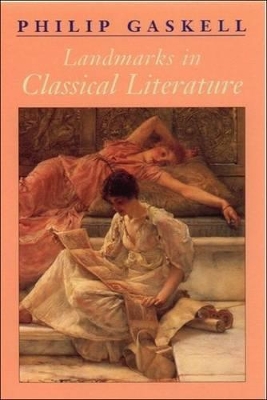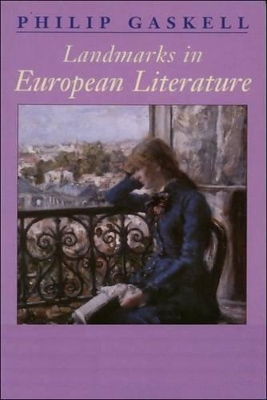Landmarks in Literature S.
2 total works
Landmarks in Classical Literature is the final volume in a set of three books about the major authors of Western literature and their works from Classical times until the early twentieth century. In this volume, Philip Gaskell introduces the work of the greatest writers of Classical Greece and Rome in translation. The book begins with prehistory and the age of the Homeric epics, the Iliad and the Odyssey; and looks at later lyric poets such as Sappho and Pindar. There follows the great age of classical Greece, of miraculous art and pristine democracy, with Sophocles and his fellow-dramatists, the historians Herodotus and Thucydides, and Plato's fascinating Socratic dialogues. After a brief consideration of the next, Hellenistic, period of Greek culture which included the work of the pastoral poet Theocritus, the book moves on to the golden age of Roman literature. Here are the poets and thinkers of late-Republican and early Imperial Rome, a turbulent period of war and grandeur, including Julius Caesar, soldier, historian, and dictator; Cicero, politician, lawyer, and letter-writer; the poets Virgil (of the Aeneid), Horace, and Ovid; and Tacitus, the greatest Roman historian.There are chapters covering politics and society, religion, culture and the arts, language, warfare, economics, technology and philosophy to enable the reader to understand and appreciate the literature in its various contexts.
Advice about reading the classics in translation, and the form and pronunciation of classical names and metre in classical verse is provided from the outset, and guidance on the best translations is given. An appendix provides more specialised information on the survival of ancient texts and textual scholarship. Features * Introduces the best and most important literature of ancient Greece and Rome * Clearly and engagingly written for readers with no prior knowledge of the period, or of Greek or Latin * Sets the authors and their works in their historical contexts
Advice about reading the classics in translation, and the form and pronunciation of classical names and metre in classical verse is provided from the outset, and guidance on the best translations is given. An appendix provides more specialised information on the survival of ancient texts and textual scholarship. Features * Introduces the best and most important literature of ancient Greece and Rome * Clearly and engagingly written for readers with no prior knowledge of the period, or of Greek or Latin * Sets the authors and their works in their historical contexts
This book introduces thirty-two key works of European literature in translation to ordinary readers. Ranging from Dante's Divine Comedy to Brecht's Threepenny Opera, Philip Gaskell takes a canon of recognised literary classics and introduces each work, setting it in the literary and historical contexts of its times. The selection of works cover the main genres of poetry, prose and drama, and the other authors included are Petrarch, Villon, Ronsard, Montaigne, Cervantes, Moliere, Voltaire, Rousseau, Goethe, Schiller, Pushkin, Lermontov, Balzac, Flaubert, Baudelaire, Rimbaud, Turgenev, Tolstoy, Dostoievsky, Ibsen, Strindberg, Hamsun, Chekhov, Gorky, Zola, Fontane, Proust, Mann, Kafka, and Pirandello. The author's skills as critic and bibliographer are demonstrated in the practical guide to translations in and out of print, and the recommendations for further reading.There are four appendices to the book that examine issues and problems of translation giving examples side-by-side of different translations for comparison; provide quotations from texts in their original languages; advise on the form and pronunciation of Russian names; and describe the value of money in the mid-to-late-nineteenth century.
Aimed at those who want to explore European literature for themselves, this is an extremely readable and entertaining introductory guide. * Evaluates thirty-two of the greatest works of European literature * Clear explanation of critical terms and modern literary developments * Includes short biographies of each author * The literary and historical contexts are expertly summarised * Suggests the best available paperback translations
Aimed at those who want to explore European literature for themselves, this is an extremely readable and entertaining introductory guide. * Evaluates thirty-two of the greatest works of European literature * Clear explanation of critical terms and modern literary developments * Includes short biographies of each author * The literary and historical contexts are expertly summarised * Suggests the best available paperback translations

